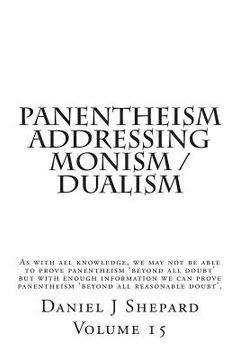Reseña del libro "Panentheism Addressing Monism / Dualism (en Inglés)"
The development of the metaphysical system of the 1st millennium accompanied us as our species explored the concept of geographical 'rights'. The development of the metaphysical system of the 2nd millennium accompanied us as our species explored the concept of global 'rights'. A new metaphysical perception needs to emerge which will dominate our expansion into the vast depths of the universe. Such a system will by necessity need to match our advances in both technology and extraterrestrial cultural intrusions and intrusiveness. If such a metaphysical system does not emerge, history will repeat itself. The time periods involving the exploration of the globe and the initial explorations of the Americas, Africa, and the East by the West lead to horrific human and environmental trauma supported by perceptions of geographic 'rights'. This trauma was not unique to Western action. The 'inhumanity' imposed upon individuals was generated by both the East and the West. Human geographical 'rights' are in the process of conceding their status to global 'rights.' Such 'rights' will have no less a negative impact upon the frontiers of the universe than geographical 'rights' had upon the frontiers of our planet. How do we avoid repeating our species past negative acts? We can do so by establishing a universal philosophy based upon a foundation of new metaphysical thought. The result is the development of a foundation for action derived from rational thought rather than depending upon a foundation for action derived from examination of past actions steeped in horrific negativity. How is one to accomplish such a monumental 'leap' in human behavior? One must identify the foundation of action which created the past history of human negativity and modify the foundation. And what is the foundation of human behavior which initiates human action? The foundation for human behavior is metaphysical thought, metaphysical perception. We are what we think we are. We are a species which acts based upon what it rationally perceives itself to be, believes itself to be, sees itself to be. In short we are what philosophy, religion, and science defines us to be. If such is the case, then what is it that science, religion, and philosophy have been debating for the last twenty-five hundred years? Religion, science, and philosophy have been debating the legitimacy of Cartesianism versus non-Cartesianism. Simplified the statement becomes: Which is correct, monism or dualism? The philosophical debate: Either awareness of awareness, intentionality, knowing is an innate characteristic of the physical or it is not. The religious debate: Either there is a soul or there is not. The scientific debate: Either awareness, consciousness is an innate characteristic of the physical or it is not. The question dominating the debate has been: Is awareness an innate characteristic of the physical. The question, however, has become distorted over time. Applying reductionism to the debate, the actual question is: Is the physical an innate characteristic of the abstract or is the abstract the innate characteristic of the physical. In essence the question becomes: Is the abstract in the physical or is the physical in the abstract and if one or the other is the case then why is it true? Modern day philosophers lean toward discussing the abstract in terms of the question: Is the abstract an innate characteristic of the physical. Modern day philosophers are in essence attempting to understand the relationship between the two: the physical and the abstract. Contemporary philosophers remain perplexed by Zeno and his identification of multiplicity and seamlessness. Philosophers, scientists, and theists do not understand how seamlessness can coexist with multiplicity and as such are baffled by the concept regarding classification ...

